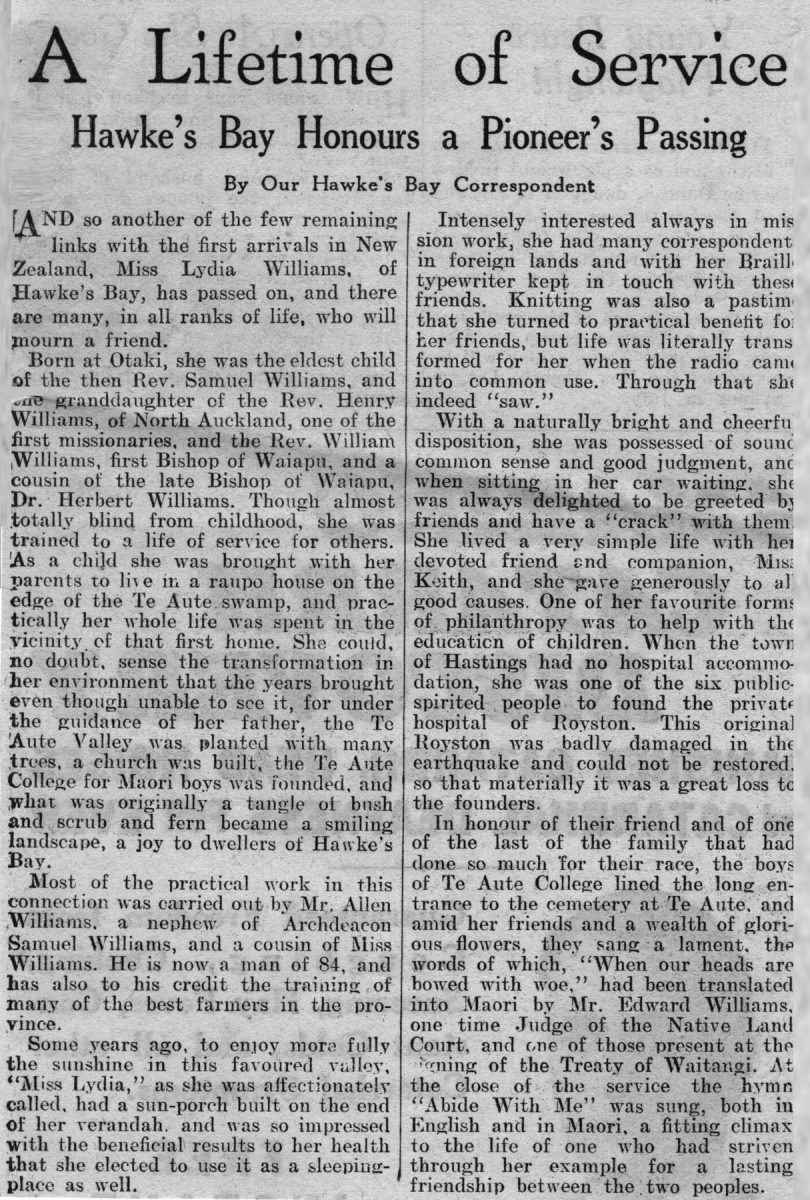A Lifetime of Service
Hawke’s Bay Honours a Pioneer’s Passing
By Our Hawke’s Bay Correspondent
AND so another of the few remaining links with the first arrivals in New Zealand, Miss Lydia Williams, of Hawke’s Bay, has passed on, and there are many, in all ranks of life, who will mourn a friend.
Born at Otaki, she was the eldest child of the then Rev. Samuel Williams, and the granddaughter of the Rev. Henry Williams, of North Auckland, one of the first missionaries, and the Rev. William Williams, first Bishop of Waiapu, and a cousin of the late Bishop of Waiapu, Dr. Herbert Williams. Though almost totally blind from childhood, she was trained to a life of service for others. As a child she was brought with her parents to live in a raupo house on the edge of the Te Aute swamp, and practically her whole life was spent in the vicinity of that first home. She could, no doubt, sense the transformation in her environment that the years brought even though unable to see it, for under the guidance of her father, the Te Aute Valley was planted with many trees, a church was built, the Te Aute College for Maori boys was founded, and what was originally a tangle of bush and scrub and fern became a smiling landscape, a joy to dwellers of Hawke’s Bay.
Most of the practical work in this connection was carried out by Mr. Allen Williams, a nephew of Archdeacon Samuel Williams, and a cousin of Miss Williams. He is now a man of 84, and has also to his credit the training of many of the best farmers in the province.
Some years ago, to enjoy more fully the sunshine in this favoured valley, “Miss Lydia,” as she was affectionately called, had a sun-porch built on the end of her verandah, and was so impressed with the beneficial results to her health that she elected to use it as a sleeping-place as well.
Intensely interested always in mission work, she had many correspondents in foreign lands and with her Braille typewriter kept in touch with these friends. Knitting was also a pastime that she turned to practical benefit for her friends, but life was literally transformed for her when the radio came into common use. Through that she indeed “saw.”
With a naturally bright and cheerful disposition, she was possessed of sound common sense and good judgement, and when sitting in her car waiting, she was always delighted to be greeted by friends and have a “crack” with them. She lived a very simple life with her devoted friend and companion, Miss Keith, and she gave generously to all good causes. One of her favourite forms of philanthropy was to help with the education of children. When the town of Hastings had no hospital accommodation, she was one of the six public-spirited people to found the private hospital of Royston. This original Royston was badly damaged in the earthquake and could not be restored, so that materially it was a great loss to the founders.
In honour of their friend and of one of the last of the family that had done so much for their race, the boys of Te Aute College lined the long entrance to the cemetery at Te Aute and amid her friends and a wealth of glorious flowers, they sang a lament, the words of which, “When our heads are bowed with woe,” had been translated into Maori by Mr. Edward Williams, one time Judge of the Native Land Court, and one of those present at the signing of the Treaty of Waitangi. At the close of the service the hymn “Abide With Me” was sung, both in English and in Maori, a fitting climax to the life of one who had striven through her example for a lasting friendship between the two peoples.












Do you know something about this record?
Please note we cannot verify the accuracy of any information posted by the community.